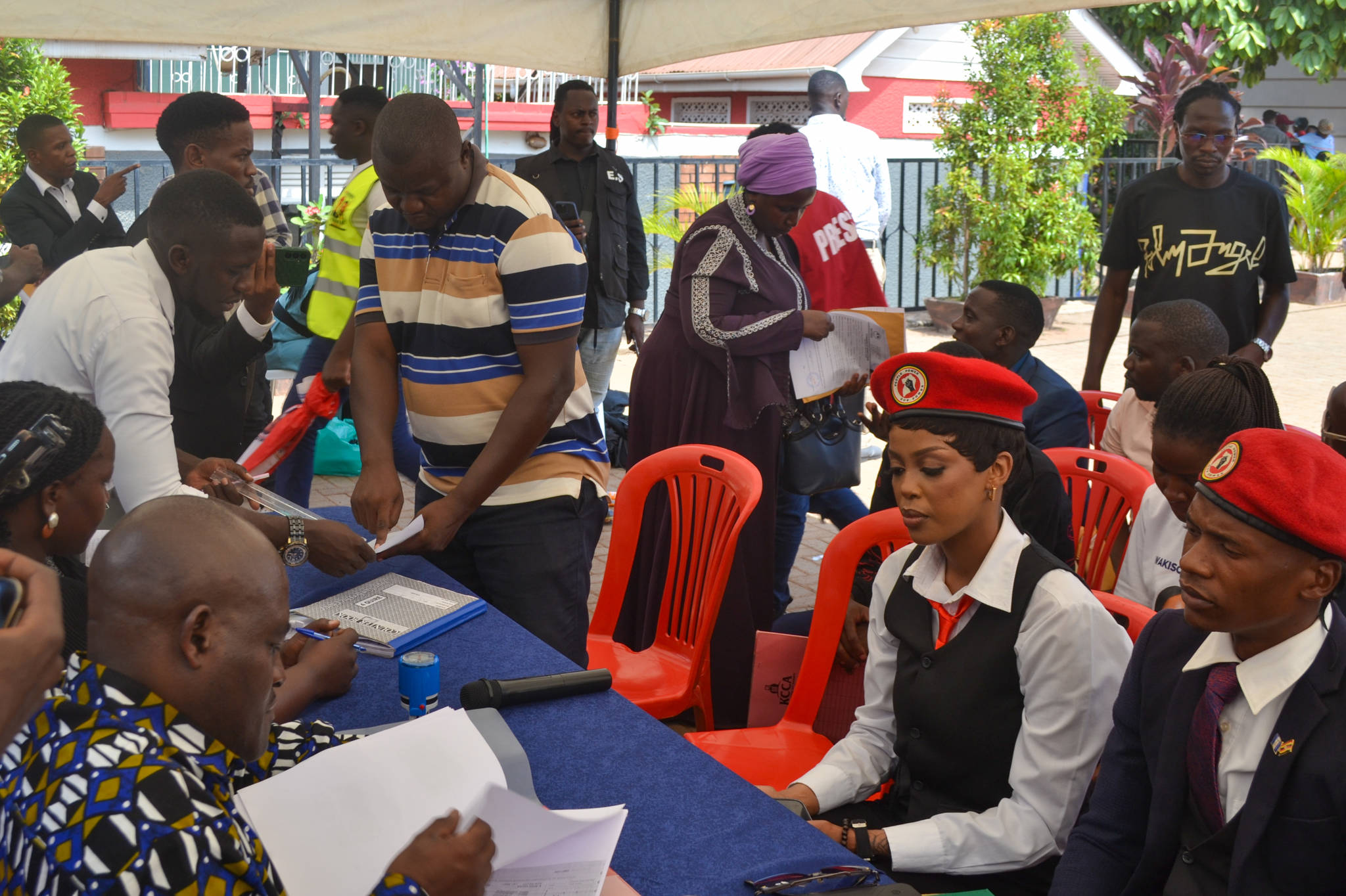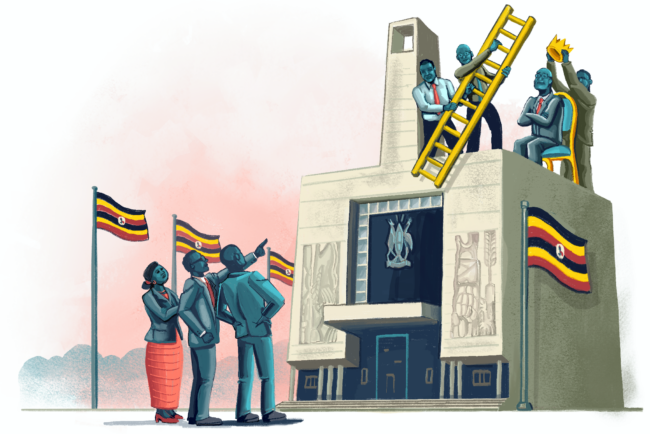SERERE, UGANDA — Family ties are shaping Uganda’s Parliament. People who die in office are increasingly succeeded by close relatives — children, spouses or even siblings — and often with strong support from political parties and local communities. At least five members of the current Parliament have succeeded their relatives, and in previous Parliaments, multiple members did as well.
When Patrick Okabe, a member of Parliament for Serere County, died in a car accident in 2022, his son, Emmanuel Omoding, ran in the by-election and won. When the speaker and member of Parliament for Omoro County, Jacob Oulanyah, died in 2022, his son, Andrew Ojok Oulanyah, replaced him. And when Rehema Watongola, the Kamuli Municipality member of Parliament, died in 2020, her daughter, Kayanga Baroda, won the seat on an independent ticket.
As Uganda’s 2026 general elections approach, some of these successors are campaigning to keep their seats. While not against the country’s constitution, critics warn that the pattern risks shrinking opportunities for fresh leadership.
“It’s an intentional factor by the political class to promote a monarchy,” says Rogers Barigayomwe, an associate professor in the Department of Development, Peace and Conflict Studies at Kampala International University.
This trend is an attempt to concentrate power in the hands of a few, he says, and it’s an issue that bleeds down from the top. President Yoweri Museveni has ruled for nearly four decades and is running for a seventh term in the 2026 general elections. His wife, Janet Museveni, serves as the Minister of Education and Sports, while his eldest son, General Muhoozi Kainerugaba, is the chief of the country’s defense forces, a role that has long fueled speculations that he is being positioned as the president’s successor.
Guaranteed continuity
Barigayomwe in part blames the country’s culture of monetized elections, where voters prioritize immediate material gains and continuity over legislative performance. “Politics is no longer about serious issues,” he says, adding that if a member of Parliament promises six ambulances and dies before delivering all, voters trust that someone from their family will continue the work.
Many communities lack public infrastructure and basic services, and legislators often step in to provide essentials such as water tanks, boreholes, schools and even public health facilities — all of which are services that the government should provide. But voters have come to rely on individual members of Parliament to fill these gaps, which legislators leverage for electoral support.
Voters, Barigayomwe says, see politicians’ relatives as guarantors of continuity. It’s part of the reason Simon Peter Higenyi, a retired teacher from Butaleja district, voted for a family member when former member of Parliament Cerinah Nebanda died in 2012, before completing her term. Her sister, Florence Nebanda Andiru, won the by-election.
Higenyi says he trusted the family’s record. They had invested in businesses in the region and set up private schools, which he says benefited the community. “They did it so we can access services,” he says.
Sometimes, community members push for family succession, says Stephen Ochola, brother of Okabe, the Parliament member who died in 2022. The community pressed for someone from the family to take his place, says Ochola, who is now a member of parliament.
“The people in Serere said, ‘We need a child from the family to replace his father,’” he adds.
Ochola says the family hadn’t planned on entering the campaign after the accident, which also claimed Okabe’s wife. But local expectations swept them into it. “It was a very difficult time for us, but we had to accept it,” Ochola says.
The former parliamentarian’s son ran as an independent candidate and campaigned on his father’s legacy of supporting churches, orphanages and community projects.
Party dominance
The trend toward nepotism is also about parties consolidating power, says Sabiti Makara, a professor of governance at Kabale University.
He says the ruling party, the National Resistance Movement, which has dominated the country’s political landscape for as long as Museveni has held power, has normalized the inheritance of political office by nominating relatives as successors and flag-bearers — a strategy to retain the seat.
“Politics is a game of numbers,” Makara says, and parties know a relative will likely win.
For example, when member of Parliament Michael Oromait died in 2012, the party chose his 19-year-old daughter, Proscovia Alengot Oromait, as flag-bearer for Usuk County. She won. On the campaign trail, Museveni, who also serves as the NRM party chair, stood beside her to show support.
And after state minister and member of Parliament Charles Okello Engola was shot in 2023, NRM presented his son, Samuel Okello Engola, as the flag-bearer for the Oyam North seat. Although he didn’t win, during his campaign, he pledged to continue his father’s legacy.
Earlier this year, the ruling party faced criticism for blocking candidates who lose in the primaries from running as independents — which some say is a way to continue its dominance over the country’s political landscape.
Emmanuel Lumala Dombo, the party director of information and publicity, doesn’t deny that the party will at times nominate a relative to succeed deceased parliamentarians.
It’s “human nature,” he says. “If you [were] a president, you would wish your son to be at that level.”
It’s not against the law, he points out, as long as those who take over meet the constitutional requirements to be in office.
Only a few benefit
The problem, Barigayomwe says, is that only a few families stand to benefit — at the expense of the public. Some families, he says, treat it like a farm or an enterprise to be inherited.
Those who inherit seats may not have the experience to do the job well, Makara says. “Democracy is supposed to be an open space for all who qualify to compete favorably.”
Successors need to be elected on merit, says George Opolot, a resident of Serere in Kampala. The inheritance of political office, he adds, limits opportunities for others to participate.

Election Worries Ramp Up as Uganda’s Ruling Party Seeks to Quash Independents
Explore
“Many of the replacements don’t perform as [well] as their predecessors did,” he says. “They only try to complete projects initiated by their departed relatives but don’t effectively represent their constituents.”
In the long run, Barigayomwe says, dynastic politics will deprive Uganda of good leaders.
“Eventually, leaders will be people detached from communities and service delivery will be compromised,” he says. “It will affect the quality of legislation.”
It all comes down to poverty, says Musa Kisayiza, a constituent from Butaleja in eastern Uganda, where Florence Nebanda Andiru replaced her sister, Cerinah Nebanda, as member of Parliament. Kisayiza says political families have more access to opportunities, such as education, than the communities they serve.
“Most of us are poor and uneducated,” Kisayiza says. “That’s why we keep voting for the same families.”
In the next elections, he wants to support a candidate who’s been disadvantaged by hereditary politics.
“We need to keep changing leaders,” he says, “to see the difference.”

